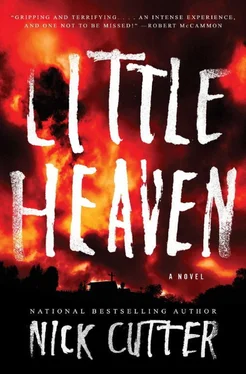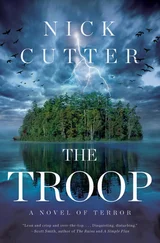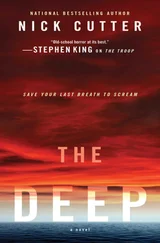In time, he stood. His eyes remained closed. His body trembled slightly. The congregation sat riveted. Ellen caught sight of Reggie out of the corner of her eye. His face was cheese white and twitchy as he stared at Amos Flesher, enrapt.
“There come a test,” the Reverend said in a stagey kind of whisper. “In the life of every man there come a test…”
Nods from the congregation. Yes, oh yes , Ellen could picture them all thinking. The Lord tests the faithful.
“The son of Brother and Sister Rathbone has wandered into the woods.”
A shocked group inhale from the congregation—it was as though they had taken a breath as a single unit.
“Eli?” said a woman in a paisley frock. “Eli Rathbone’s missing?”
The Reverend paused, as if unsure of the boy’s name.
“He is safe,” Reverend Flesher said sharply. He cast a baleful eye upon the woman until she sat down again. “The Lord assures me of this. Brother Swicker and Brother Neeps have been looking for him, along with his parents. But now we all must gather. The light draws thin. The poor boy shall not spend the night outdoors.”
Everybody rose. People were animated now—their bodies moved with the jerky-limbed mania that grips a group of people on the cusp of mass hysteria. The Reverend’s chin was tilted upward, his face set in a mask of forbearance—Ellen wondered: Did he envision the boy’s disappearance as a test for himself ?
Ellen, Minerva, and Micah filtered into the square, where the adults were gathering. The children had been sent off to the bunkhouses. A few people had flashlights. Ellen spotted Reggie carrying a lantern that gave off a weak glow, its glass blackened with kerosene smudges. Rags were tied to the tips of scrap two-by-twos and dipped into a bucket of creosote. The jury-rigged torches were lit with a Zippo passed from person to person. This all happened quickly and silently. The two-by-twos, rags, and creosote were all at the ready, as if waiting for this very eventuality.
The armed men who looked like brothers addressed the throng.
“Eli’s folks is out thataway,” the one with the rifle said, pointing at a general area past the fence. “They ain’t seen the boy in a few hours. They thought he was with the others in the play area.”
The man with the holstered gun was smoking a home-rolled cigarette. He flicked the butt into the weeds and said, “A mother ought to keep mind of her kids.” He cast an eye on the group, picking out the mothers in its midst. “Ain’t that a pure fact?”
Nobody spoke against him. The torches crackled, sending up plumes of stinking smoke. The flames flickered on the worshippers’ pale pinched faces.
“We’ll fan out,” said the rifleman. “East, west, south, north. No telling whichaway the boy went, or how far afield.”
“Better not be too far,” his partner said. “The woods are a dangerous place to be at night.”
The rifleman grinned. “Lovely, dark and deep.”
Ellen did not care for these two. They seemed to be taking delight in this. The rifleman then pointed at the outsiders.
“You stay here. This is not your calling.”
Minerva and Micah were already holding torches. Micah levered his torch back on his shoulder until his face grew dark. “Your call,” he said.
“It is,” said the rifleman, and spat. His partner rested the heel of his palm against the butt of his revolver. “And I say sit .”
The group exited through the main gate. The monolithic expanse of the woods dwarfed them; the flimsy light of their torches quickly dwindled under the brooding darkness of those trees. The worshippers paired off and began to sweep the woods. Voices called out from every direction.
“Eli?”
“Eli!”
“ Eli! ”
“Child, come home! God wants you to come home!”
The light of their torches was swallowed by the night. Soon their voices were gone, too. Ellen, Minerva, and Micah stood in the parade square. There was not much else to do. It wasn’t like there was a horseshoe pit or a bingo game they were missing.
A lone figure rounded back into the compound. Charlie Fairweather.
“I don’t care what Cyril or Virgil says,” he said. “That boy needs all the help he can get.”
“Okay,” said Micah.
DURING THE WAR,Micah used to drive trucks full of the dead.
Between ten and fifteen bodies piled into the back of an old GMC Deuce-and-a-Half. The bodies of GIs and medics and radiomen and the odd noncombat pogue who had found himself in the wrong place at the wrong time. The bodies were intact, by and large, though sometimes the stray parts had to be zipped into canvas sacks. They were usually frozen—not strategically, just because the icy temperatures ensured that most of them were rock hard for transport.
Micah and another marine, Eldon Tibbs, would drive them from the front line to Hamhung, a port town under US occupation. It was suspected that the Chinese would strip, loot, and debase the corpses otherwise.
There was one night, winter of 1952. Micah was at the wheel for that haul. He was nineteen years old. The road wound through the pines, which were cottony-looking, with bluish moss hanging from their branches like seaweed. Tibbs didn’t talk much. He and Micah got on just fine. Tibbs smoked a pipe packed with cherry tobacco. He received it every month in a thick waxed envelope. One of his brothers sent it. He was smoking when it happened.
Micah did not see or hear the shot that killed Tibbs. It was either perfect or just plain lucky—bad luck for Tibbs. A hole appeared in the passenger window, and the side of Micah’s face was plastered with wet warmth.
Tibbs’s lit pipe fell into Micah’s lap. The road hit a bend. Tibbs’s body slumped heavily against Micah. A flap of skin from his blown-apart face slapped against Micah’s neck. He smelled the thick iron of Tibbs’s blood.
Wind shrieked through the window hole as the truck veered into the trees. Micah tried to correct the fishtail, but the front end dipped over the edge of the road into a gully. Micah was thrown into the windshield, which splintered when he struck it.
He grabbed the pistol from Tibbs’s holster and heaved himself from the cab. Blood flowed freely from his forehead. Whoever shot Tibbs couldn’t be far away.
He staggered around the side of the truck, keeping low on the gully side. The truck’s rear doors had popped open. Bodies lay scattered over the road. Corpses rested at horrible broken-backed angles. A few of the zippered sacks had burst, spraying remains. The ragged edges of frozen flesh had a crystalized look, crusty red like freezer-burned steak.
Micah crept to the bumper. Ice had formed to a webbing between the black bones of the trees across the road. A figure was approaching down the ditch across the road. Micah fired. The slug missed wide. The figure dropped out of sight.
Next, a round struck the truck a few inches above Micah’s head. He spun away; his heels skidded out from under him and he went down hard on his ass. He pivoted onto his stomach, watching the road from under the truck chassis.
A single Chinese soldier crept out of the ditch. What was he doing so far behind enemy lines? Either crazy or overconfident. He must have thought he’d hit Micah, that he was dead. The man drew nearer. His face was smeared in lampblack. Micah waited until he was so close that all he could see was his legs, then squeezed the trigger.
The slug went through the man’s shin. The man cried out and awkwardly fell. Micah put another round into his head. The man’s flyaway corn-silk hair puffed up as the bullet drilled into his brain.
Micah spent the next twenty minutes loading bodies into the truck. Some had spilled into the earth under the trees, which was weirdly spongy despite the night’s chill, carpeted by a strain of moss he had never encountered. It was hard work—dead bodies possessed an ornery, uncooperative weight. He put the dead Chinaman in with them.
Читать дальше












